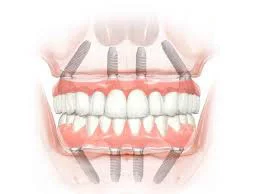Implant-supported dentures are one of the most modern ways to replace missing teeth today. They are aimed primarily at people who have lost many or even all of their teeth and no longer want to put up with the wobbling or pressure of conventional dentures. Perhaps you feel the same way: You desire a stable, comfortable, and aesthetic solution? In this article, you will learn how it works, what advantages and disadvantages there are, and for whom this long-term solution is particularly suitable. The article is aimed at people who have lost many or all of their teeth and desire a stable, comfortable, and aesthetic alternative to conventional, often wobbly dentures.
This article will answer some of the most common questions patients ask us:
- What are implant-supported dentures?
- Are implant dentures better than regular dentures? Pros and cons
- What’s the procedure for getting implant supported dentures?
- How do you take care of them?
- And of course – how much do they cost?
What are implant-supported dentures?
Implant-supported dentures are a modern form of prosthetics that is firmly connected to dental implants in the jaw. Unlike a conventional full denture, it does not just sit loosely on the gums. The result? More stability, more security when eating and speaking, and as a bonus, a boost in self-confidence. Depending on your preference, the solution can be designed as removable or permanently fixed.
Types of implant-supported dentures
Removable (Snap-In) Dentures
In this variant, the dentures snap onto the implants with special connecting elements. Advantage: They sit securely and can be easily removed for daily cleaning. A practical mix of stability and flexibility.
Fixed (permanent) Dentures
Fixed dentures are screwed or cemented in place. It feels almost like having your own teeth in everyday life. Removal? Not necessary. Only your dentist can detach it if needed. Ideal for anyone looking for a permanent solution and wanting to regain the feeling of natural teeth.
Are implant dentures better than regular dentures? Benefits and disadvantages
Benefits
- Stability and comfort: No slipping, no pressure points. Implants provide secure hold in everyday life.
- Better chewing, better eating: With more bite force, it’s easier to enjoy crunchy or harder foods. And this has a direct positive effect on nutrition and digestion.
- Bone preservation: Implants stimulate the jawbone – thus preventing bone loss, which otherwise quickly sets in after tooth loss.
- Natural Appearance: An implant not only offers a solution for functional problems but can also provide aesthetic benefits. The facial structure is preserved, you look younger, and it gives you back your confident smile. Appearance and quality of life can be improved. However, it is important to consider both medical and financial aspects when making the decision.”
Disadvantages
- Higher Costs: Of course, compared to classic dentures, the effort is greater. But the result speaks for itself.
- Surgical procedure necessary: It cannot be done without placing the implants. As with any procedure, there are certain risks such as infections or swelling.
- Longer treatment time: Healing requires patience; several months is normal.
- Risk of implant failure: Very rare, but possible – especially in smokers or with insufficient oral hygiene.
- Regular care necessary: Check-up appointments and effective cleaning remain mandatory.
- Not every patient is suitable: For implantation, sufficient bone mass and good general health are generally required. However, as part of an individual consultation, we carefully examine the possibilities and offer an individual solution in every case.
What’s the procedure for getting implant supported dentures?
Perhaps you are wondering: “How does the whole thing actually work?” Don’t worry – we will proceed step by step together. From the first examination to the finished dentures, you are not alone.
- Consultation and planning: It starts with X-rays or 3D scans to evaluate your bone and plan the best placement for implants.
- Surgery: Implants are placed into the jawbone under local anesthesia – generally painless and well tolerated. After that, the jaw needs time to heal. During these months, the implants and bone fuse together (osseointegration).
- Attaching the dentures: Once healed, custom dentures are fitted and secured, either as snap-in or fixed, depending on your treatment plan.
How many implants are needed?

The number depends on your situation. In the lower jaw, 2–4 implants are often sufficient, in the upper jaw usually 4–6 implants. Decisive factors include bone quality, type of denture, and the forces exerted during chewing. We will look at this individually and discuss everything with you in peace.
Common concerns and risks
Even though the success rates are very high – it is not completely without risk. Infections, loose dentures, or in rare cases implant failure can occur. Risk factors such as smoking, inadequate oral hygiene, or chronic illnesses increase the probability. Important: Those who report problems early can almost always expect a quick solution.
What’s the best material for implant dentures?
When choosing the material, it’s not just about appearance, but also about durability, comfort, and of course your budget. The most common variants at a glance:
- Acrylic with metal framework (Hybrid dentures): The most cost-effective and widely used solution in terms of price.
Base: Acrylic resin
Teeth: Acrylic or composite
Framework: Titanium bar or metal framework
Advantages: light, comfortable to wear, easy to adjust and repair.
Disadvantages: less durable, aesthetically not as high-quality as zirconia or porcelain. - Zirconium oxide (monolithic): The premium solution for the highest demands.
Material: Solid zirconia ceramic.
Advantages: extremely robust, resistant to breakage and stains, looks deceptively real.
Disadvantages: significantly more expensive, adjustments or repairs are more difficult, sometimes feels heavier. - Porcelain (fused to metal): Very aesthetic, but nowadays less common for full dentures. More often used for crowns or bridges.
Advantages: wonderful, natural appearance, durable.
Disadvantages: more expensive, heavier, and more prone to chipping. - Our tip: Zirconium oxide is the choice for anyone who values a result that is as natural as possible and has a long service life. Those who want a flexible and cost-effective model will do very well with acrylic plus metal.
How do you take care of them?
Implant-supported dentures need to be cared for – just like natural teeth. Brushing, flossing, daily cleaning. Removable variants should be taken out and thoroughly cleaned every day. And: Regular check-ups with the dentist are mandatory to keep an eye on the implants, gums, and bone.
And of course – how much do they cost?
The cost of implant-supported dentures varies greatly – depending on the country, material, and implant manufacturer. It’s no secret: Many patients decide to have the procedure abroad, as it can be cheaper for the same quality. However, it is important to check all options beforehand, including those domestically. In Hungary, treatment is significantly cheaper, without compromising on quality or safety. Many patients from Germany, Austria, Switzerland, or Great Britain therefore choose this path – and leave the practice with a new, confident smile.
Conclusion: Is it worth it?
Yes – for many patients, definitely. Implant-supported dentures are stable, comfortable, and look absolutely natural. Of course, they are more expensive and the path to getting them requires patience. But the long-term benefits for quality of life, health, and self-confidence make this solution an investment that is worth it.


